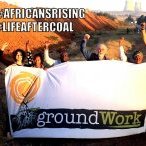English · Español

25 May 2017 | Interviews | Victims of climate change | Monitoring transnationals | Resisting neoliberalism | Human rights | Extractive industries | Climate Justice and Energy
Press conference: “Impact of dirty energy on communities in Africa. Leave the oil in the ocean in Togo”
Download: MP3 (10.8 Mb)
“Energy production nowadays comes together with the destruction of livelihoods and human rights violations”, and its aim is to get profits for corporations and not for the peoples’ welfare. “Community resistance is vital for us, it is the pillar, the building block for a radical shift away of the current energy system”, said on Tuesday the Chair of Friends of the Earth International, Karin Nansen.
“As a federation we believe in the urgent need of a radical change of the current energy system, and the need to reclaim peoples’ and communities’ control over it”, added Nansen in a press conference held in the town of Avepozo, to the east of the capital city of Togo, Lome.
The conference, titled “Impact of dirty energy on communities in Africa. Leave the oil in the ocean in Togo”, was the opening session of the General Assembly of Friends of the Earth Africa, hosted this year by Friends of the Earth Togo.
The community of Doevi Kopé, near Avepozo, was a special guest of the activity carried out by Friends of the Earth Togo. They have been experiencing oil exploration works in the area where they live and in the sea, with the involvement of Italian oil giant ENI. There might be extraction works too, which is still to be decided. The community is also facing coastal erosion, because of the sea level rising, which affects its livelihood.
Since a few days ago, ENI and its subsidiary in Nigeria, the Nigerian Agip Oil Company (NAOC), are facing a historic lawsuit in Italy, filed by the Nigerian Ikebiri community (from the Bayelsa state), for environmental crimes in their lands. Friends of the Earth Nigeria and Friends of the Earth Europe are supporting the Ikebiri community in the case.
Nansen, Uruguayan, expressed in Avepozo huge solidarity with the Doevi Kopé community. She considered that the current energy system does not guarantee the peoples’ right to energy and leads to the climate crisis.
Regarding this, Friends of the Earth International’s Climate Justice and Energy Program coordinator, Dipti Bhatnagar, said that she came from Mozambique, where “less than 20 per cent of the people have access to energy, and this is an injustice”. A radical change in the production of energy is urgently needed, because “the main cause of climate change is burning fossil fuels”, said Bhatnagar. “We need a different path, we need a different development model”, she added.
Bhatnagar also stood in solidarity with the community of Doevi Kopé and explained that Friends of the Earth International goes every year to the United Nations’ negotiations on climate change to defend the rights of the peoples and communities from the Global South, and to pressure the Northern countries so that they are pointed as responsible for the climate crisis and take the actions needed to combat it.
Finally, the facilitator of Friends of the Earth Africa, David Kureeba, also member of NAPE – Friends of the Earth Uganda, informed in the press conference about the work the region is doing against extractive activities, and the campaigns to stop the violations of communities’ rights.
Imagen: groundWork – Friends of the Earth South Africa







